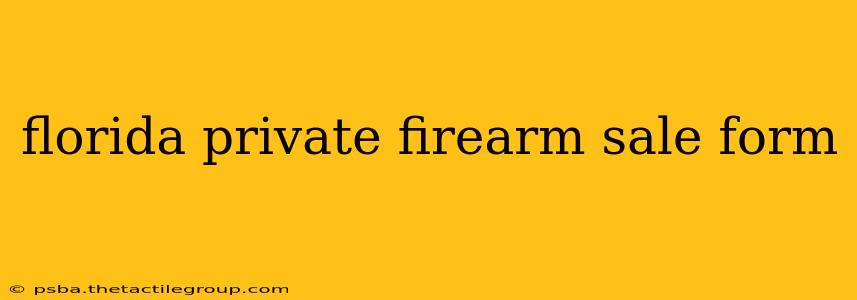Selling or buying a firearm privately in Florida requires understanding the state's regulations. Unlike many states, Florida doesn't mandate a specific, state-provided form for private gun sales. However, navigating the legal landscape surrounding these transactions is crucial to ensure compliance and avoid potential legal issues. This guide will walk you through the essential steps and considerations for private firearm sales in Florida.
Understanding Florida's Gun Laws Regarding Private Sales
Florida law dictates that certain individuals are prohibited from owning firearms. Before engaging in any private sale, both the buyer and seller must be aware of these restrictions. Failing to comply can lead to severe penalties. These restrictions include, but are not limited to:
- Felons: Individuals with felony convictions are generally prohibited from possessing firearms.
- Domestic Violence Injunctions: Those subject to a domestic violence injunction are often restricted from owning firearms.
- Mental Health Issues: Individuals adjudicated as mentally defective or committed to a mental institution may be prohibited.
Key Steps for a Safe and Legal Private Firearm Sale in Florida
While there isn't a mandatory form, several crucial steps ensure a smooth and legal transaction:
1. Verify Buyer's Eligibility:
This is the most critical aspect. You are responsible for ensuring the buyer is legally allowed to possess a firearm. While you aren't required to conduct a background check in a private sale, taking reasonable steps to verify the buyer's eligibility is strongly recommended to avoid potential legal ramifications. You might consider asking for documentation, although this is not legally mandated in Florida.
2. Bill of Sale: Creating Your Own Documentation
Although not legally required, a detailed bill of sale is highly recommended. This document should include:
- Date of Sale: Clearly state the date the firearm changed hands.
- Description of Firearm: Include make, model, serial number, and caliber. Be as specific as possible.
- Seller Information: Your full name, address, and contact information.
- Buyer Information: The buyer's full name, address, and contact information.
- Purchase Price: The agreed-upon price of the firearm.
- Signatures: Both the buyer and seller should sign and date the document.
This bill of sale serves as proof of the transaction and can be beneficial should any legal issues arise. Consider keeping a copy for your records.
3. Know the Specifics of the Firearm:
Before the sale, familiarize yourself thoroughly with the firearm's specifications and any applicable regulations. Understanding the firearm's legality and any restrictions on its sale is crucial.
4. Safe Transfer Practices:
Prioritize a safe and legal transfer. Meet in a public place, during daylight hours, for the exchange. This is advisable for both parties' safety and peace of mind.
Understanding Federal Regulations
While this guide focuses on Florida's private firearm sale laws, remember that federal regulations also apply. The Bureau of Alcohol, Tobacco, Firearms and Explosives (ATF) has regulations governing the sale of certain firearms, especially those considered "NFA items" (National Firearms Act). If you are selling a firearm that falls under these regulations, you must adhere to the relevant federal laws.
Disclaimer:
This information is intended for educational purposes only and should not be considered legal advice. It is essential to consult with legal counsel for specific guidance regarding Florida's firearm laws and regulations. The laws surrounding firearm ownership and transfer are complex and subject to change. Always ensure you are up-to-date on the current regulations.

